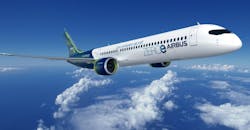Delta Joins Airbus Project for Hydrogen-Fueled Flight
Delta Air Lines has been identified as the commercial carrier joining Airbus in its effort to develop hydrogen-powered aircraft, known as “ZEROe”. The project’s goal is to introduce the world’s first zero-emission commercial aircraft by 2035, based on hydrogen propulsion. Three aircraft configurations are being pursued, according to Airbus: a commercial jet with turbofan engine technology, other options would include a jet with a turboprop configuration and a blended-wing aircraft with two hybrid-hydrogen turbofan engines.
The airline is making no financial investment in the development, but according to a Delta spokeswoman its input will ill focus defining the requirements for deploying a hydrogen-powered passenger aircraft, including, including production of liquid hydrogen in the U.S. and making the fuel accessibility at U.S airports.
Airbus has said it is working to establish a combustion technology that uses liquid hydrogen fuel, combusted with oxygen and powering modified gas-turbine engines – either turbofan or turboprop units.
Last month Airbus reported it is in partnership with jet engine manufacturer CFM International is to complete ground and flight tests for a hydrogen-fueled direct combustion engine. The demonstrations will be carried out during the mid-2020s, according to a joint statement, while the target for introducing a zero-emission aircraft is 2035.
CFM, a joint venture of GE Aviation and Safran Aircraft Engines, will modify the combustor, fuel system, and control system of a GE Passport™ turbofan engine to run on hydrogen. The U.S.-built engine was selected because of its size, advanced turbo machinery, and fuel flow capability, according to CFM. It will be mounted along the rear fuselage of the flying testbed to allow engine emissions, including contrails, to be monitored separately from those of the engines powering the aircraft.
Extensive ground testing will precede that flight test on an Airbus A380 aircraft.
Delta is among the largest operators of Airbus jets, with 368 aircraft available and commitments and/or options for a further 355 Airbus jets of the A220, A320, A330, and A350 series.
